…it is not a wisdom of this age or of the rulers of this age, who are doomed to pass away. But we impart a secret and hidden wisdom of God (1 Corinthians 2:6-7). Put simply, there are two wisdoms, Paul says: human wisdom, and divine wisdom. They are not the same. They are not even similar. They are not coming to the same conclusions about God, life, priorities, joy, fulfillment, or meaning.
Jesus
Your Salvation: Paid In Full
When Jesus had received the sour wine, he said, “It is finished,” and he bowed his head and gave up his spirit (John 19:30). The phrase Jesus uses here on the cross expressed a business transaction completed: “paid in full.” At the heart of trusting in Jesus Christ for salvation is the confidence that nothing else needs to be added to the price he paid, in his death, for our salvation. Do you live in the reality of a fully-paid salvation each day?
What Is Salvation, and Where Is It Found?
For by grace you have been saved through faith. And this is not your own doing; it is the gift of God (Ephesians 2:8). Salvation means “to deliver” someone out of danger. Salvation, especially in the Bible, implies then that people need to be saved. It also implies that someone is able and willing to save the person who needs to be saved. The Bible teaches that Jesus Christ is the only source of true salvation for any human being.
Jesus Says, “I Am the Door”
I am the door. If anyone enters by me, he will be saved and will go in and out and find pasture (John 10:9). It is easy and common to skip over this reference of Jesus to himself as the door and jump straight to him as the shepherd (also in this passage in John 10). But pause and consider that Jesus says he is not only the shepherd of his sheep but he is also the door. In other words, Jesus is not only the shepherd of the sheep, but he is also the way through which he leads
Location, Location, Location
There is therefore now no condemnation for those who are in Christ Jesus (Romans 8:1). There is a well-known real estate maxim that lists the three most important characteristics of any property: “Location, location, and location.” This famous real estate maxim holds true in the Bible, as well. In the Old Testament in particular leaving Israel is seen as departing from God, and returning to Israel represents one’s returning to God.
Crushed For Our Iniquities
He was pierced for our transgressions; he was crushed for our iniquities; upon him was the chastisement that brought us peace, and with his wounds we are healed (Isaiah 53:5). At the heart of the gospel — at the heart of what happened on the cross to Jesus Christ — is substitution. It is Jesus taking the place, and therefore the punishment, of sinners who deserved God’s wrath. At the cross, Jesus got what we deserved. Isaiah 53:5 gives us this clear insight into Jesus’ death.
Lead Us Not Into Temptation
Lead us not into temptation (Luke 11:4). (Today’s is the last in a brief series of meditations on the Lord’s Prayer.) James says no one can say God has tempted him; this request, then, is for God to keep us from situations where we might fall. It is a recognition of the dangerous, bait-riddled, sin-inducing nature of this world. If love of money doesn’t get us, perhaps the temptation to fit in with the crowd will.
Forgive Our Sins
Forgive us our sins (Luke 11:4). (We are continuing in our brief series of meditations on the Lord’s Prayer.) Jesus teaches us to pray daily (see previous post) for the forgiveness of our sins, assuming (as we ought to) that we have strayed from the mark each day. Sins are sins — they are not merely mistakes, flaws, personality, or “my truth versus your truth.” And every sin is against God ultimately, and so must be dealt with before God (Psalm 51:4)
Give Us Our Daily Bread
Give us each day our daily bread (Luke 11:3). (We continue today in our brief series on the Lord’s Prayer.) The opening requests that Jesus models for us are about God — so like God they are majestic, huge, and inspiring. A lesson Jesus clearly means for us to learn in this prayer is that God comes first, and only when God is first does everything else matter or fall into place. However, the following pleas that Jesus himself places in our mouth are about us — and like us they are daily, mundane, unspectacular.
Your Kingdom Come
Your kingdom come (Luke 11:2). In my last post I began a series of brief meditations on the Lord’s Prayer. The prayer begins with the request for God’s name to be hallowed, followed immediately with the prayer for his kingdom to come. When we ask for God’s kingdom to come, we are reminded that not only is God’s name and glory to come first — but also God’s desires, his will, his purposes, and his authority.
Hallowed Be Your Name
When you pray, say: “Father, hallowed be your name” (Luke 11:2). It is doubtless true that the Lord’s Prayer is routinely abused around the globe every day, mouthed by people who neither think about its meaning, nor would mean it even if they did. This is why Martin Luther referred to the Lord’s Prayer as “the greatest martyr on earth.” It is, as it were, butchered by thoughtless, soulless prayer on a daily basis. However, the other extreme, into which many evangelicals today have fallen (and it’s just as bad) is this: we have largely neglected it!
You Are With Me
The psalmist famously writes: “Even though I walk through the valley of the shadow of death, I will fear no evil, for you are with me; your rod and your staff, they comfort me” (Psalm 23:4). Francis Schaeffer, in his book The God Who Is There, references a tragic poem found with the body of a 23-year old young woman and drug addict who had committed suicide. The note read:
The Way, the Truth, the Life
Jesus said to him, “I am the way, and the truth, and the life. No one comes to the Father except through me” (John 14:6). Nothing could be more purely practical than this passage, this claim by Jesus! Yes, it is a theological claim, but it should be far more than another point of orthodoxy for us as Christians.
I Have Other Sheep
In John 10:16 Jesus says, “I have other sheep that are not of this fold. I must bring them also, and they will listen to my voice. So there will be one flock, one shepherd.” When you hear these words, what is your gut reaction? Are you offended that Jesus is just as concerned about homeless people and third-world gorilla fighters as he is about you? Or do you feel unconcerned for “other” people, because they’re totally different than you, although Jesus loves them also?
What Is the Book of Revelation About?
The book of Revelation is perhaps the most controversial book in the Bible among Christians. Even sincere, Bible-believing Christians seem to come up with more widely varying interpretations of this book than of any other passage or prophecy. The variety and severity of these disagreements can be intimidating or discouraging to the simple reader, who may feel that there is no one Truth to be found within its mysterious pages. But it is vitally important to remember that God did not inspire the writing of Revelation to bring confusion, but hope and joy to his suffering church.










